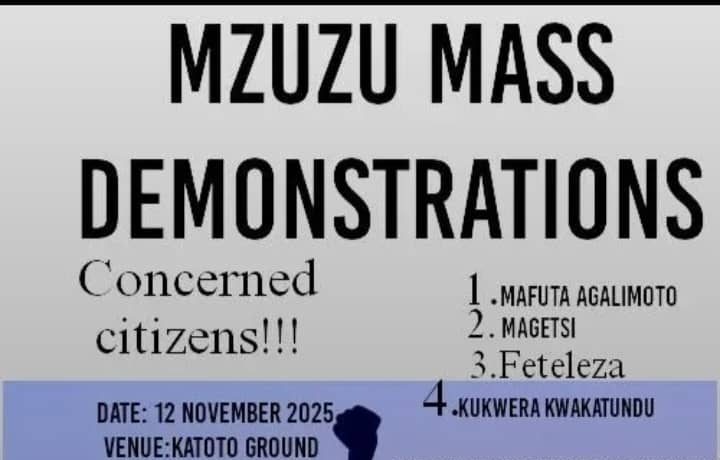Mzuzu — Anger is boiling over in Malawi’s northern city of Mzuzu, where a group calling itself Concerned Citizens has announced plans for mass demonstrations on 12 November 2025, demanding an end to what they call “political failure” — and openly calling for a military takeover.
The protesters, who plan to gather at Katoto Ground at 9 a.m., say they are fed up with worsening economic hardship under the new Democratic Progressive Party (DPP) government of President Peter Mutharika.
Their grievances — outlined in a circulating poster titled “Mzuzu Mass Demonstrations” — include fuel shortages, electricity blackouts, skyrocketing fertilizer prices, and rising costs of goods.
“We removed Chakwera because things were bad — no fuel, no fertilizer, no electricity,” said one of the organizers in a statement. “But even now, with this new regime, nothing has changed. In fact, it’s getting worse.”
The group accuses both past and current leaders of failing the nation, claiming that Malawi’s politicians are more interested in power than in serving the people.
“Politicians have failed this country. If this continues, then let the military take over — maybe they can fix what these leaders have broken,” one of the protest leaders declared, echoing frustrations similar to those that have triggered military interventions in other African countries.
The call for military rule — once a taboo topic — reflects the growing desperation among Malawians struggling to survive amid record fuel prices, erratic electricity supply, and escalating food costs.
Security authorities in the Northern Region have confirmed awareness of the planned demonstrations and are urging the organizers to follow legal procedures to maintain peace and order.
For many in Mzuzu, however, patience has run thin.
“We are tired of lies,” said another protester. “If democracy means suffering, then maybe it’s time for something different.”
The planned demonstrations could mark a new turning point in Malawi’s political tension — a cry not just for reform, but for radical change, as citizens question whether civilian leadership still holds the answers.













